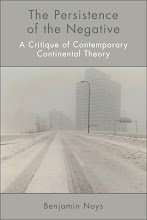
Formalism and the Subject (Form and Formalism II)
November 29-30, 2010
Jan Van Eyck Academie
Maastricht, Netherlands
Organized by: Pietro Bianchi and Tzuchien Tho
Please see our
website for abstracts and updates
‘The object of science is no longer only the specific domain of problems — of obstacles to resolve — it is also the intention and the aim of the subject of science. That is to say, it is the specific project that constitutes a theoretical conscience as such.”
--What is psychology? Georges Canguilhem, 1958
A contemporary positivist doxa situates a partition between science and philosophy where the former would constitute the domain of formal models based on the foreclosure of the subject and the latter would address the critical stance from the point of view of the empirical experience. This situation counterposes a mutually exclusive relation between a domain of consciousness and its correlative object of cognition: between a critical stance legitimated under the name of veracity and the domain of a-historical and a-subjective formal theorization. In this positivist psychologization of the “subject” of science, we are faced with two dead ends. Either we accept the merely “critical” standpoint of a philosophical subject that remains outside and, as the philosophers would have it, above, science, or we reduce subjectivity itself to the internal circulation of the object-subject relation that satisfies the normalized standards of correlative veracity.
This counter-position constitutes a fundamental obstacle for the contemporary approaches to rethink and re-problematize the nature of so-called “objective” knowledge. The place of the subject is an “in-between” which seems to be reluctant to every form of reduction, representation, formalization. Constantly doomed to the oscillation between the enunciated and enunciation, between what is said and the very event of saying, between the signifiers and the letter, between the speaking body and the grammatical subject. Is the subject simply a voided place-holder with no substantiality? The pure movement of the impossible rapport between the two?
Investigation by means of the issue of formalism intervenes here as an alternative. As one of the very means by which this separation between the subject (or mind, consciousness, etc.) and object (or world, reality, etc.) is made, the investigation of formalism itself is an opportunity to tear the subject away from its merely critical or, alternatively, empirical determinations. In other words, if formalism is the means by which a consciousness represents to itself the nature of the external reality, then the interrogation of this space of formalization itself is none other than the reckoning with the very nature of this counter-position between the subjective and objective. If so, then the transformation of the formal dimension is also the transformation of this rapport: the reconstitution of the subject, its representations and its localization in the field of knowledge and discourse. This dynamical movement, between formalization and (re)localization, is no doubt reorganized and renormalized into a constituted scientific body of knowledge in due course. Yet, in this narrow gap of indetermination, a vision of a “subject”, caught between empirical consciousness and its objective constitution, opens into a possible nomination that may allow us to seize a conception of a “subject” which points to an excess “in-between” which seems to resist determination.
The aim of the workshop is to try to address the avenues afforded for rethinking the problem of the subject by the investigation of formalism itself. Working in the context of the paths opened by the French epistemologie tradition, psychoanalysis and the recent wave of French anti-phenomenological philosophies of Deleuze and Badiou, we hope to explore the new frontiers that lie on the horizon as recent innovations in the formal sciences (formal logic and mathematics) have not only granted us new means to interrogate the domain of subjectivity but also allow us to transform its very topos. This will also be an opportunity to reevaluate the status of psychoanalysis' use of formal structures (matheme, knots and topology) in light of recent developments in these fields.
Schedule:
29/11/2010 Monday
14h – 14h30
Formalism and the subject: elements toward a problematic
Welcome and introduction by Pietro Bianchi and Tzuchien Tho
14h30-16h30
Form and Logical Structure in Badiou's Logiques des mondes
Beau Madison Mount
Response by Tzuchien Tho
16h30-18h30
Formalism and the Subject: Reflections on the Origin of Gauge Theory
Silvia de Bianchi
Response by Tzuchien Tho
19h
Conference Dinner
30/11/2010 Tuesday
11h-13h
Formalisation and situation: Some elements for a materialistic reading of Lacan’s “four discourses”
Livio Boni
Response by Tom Eyers
14h-16h
Topological forms and their descriptive logic —the implications for thinking the subject in Deleuze’s The Fold, Leibniz and the Baroque
Niamh McDonnell
Response by Pietro Bianchi
16h-18h
Consistence/Inconsistence: Disruptions in the Isotopy of a Borromean
Benjamin Bishop
Response by Carlos Guillermo Gómez Camarena
19h
Roundtable discussion
++++++++++++++++++++++++++++++++
 Jodi Dean, Blog Theory (book launch and discussion), Chair: Matthew Fuller, Respondents: Nina Power, Owen Hatherley
Jodi Dean, Blog Theory (book launch and discussion), Chair: Matthew Fuller, Respondents: Nina Power, Owen Hatherley



